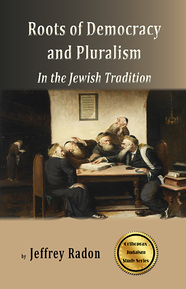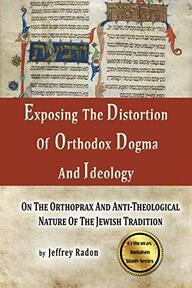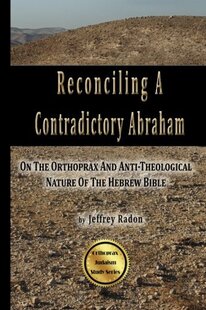Books by Jeffrey Radon

Roots of Democracy and Pluralism in the Jewish Tradition
Roots of Democracy and Pluralism in the Jewish Tradition is a study book consisting of an analysis of issues and sources on the democratic and pluralistic nature of traditional Judaism as a religion. The heart of the book is a response by the author, Jeffrey Radon, to an article concerning relations between religious and secular Jews, and between orthodox and non-orthodox Jews.
There is a widespread conception not only in the orthodox world (modern orthodox and ultra-orthodox) but also in the secular Jewish world according to which there is an opposition between Judaism and democracy. Jeffrey Radon argues that this is a misconception – and, there are very deep roots of democracy, pluralism, mutual respect and tolerance in the Talmud as the basis of the Jewish rabbinic tradition.
This book is intended to give orthodox Jews a basis for a democratic approach to the Jewish tradition, and to present to secular and non-orthodox Jews a democratic approach to the Jewish tradition in order to enable them to draw closer to their culture and heritage.
Roots of Democracy and Pluralism in the Jewish Tradition is a study book consisting of an analysis of issues and sources on the democratic and pluralistic nature of traditional Judaism as a religion. The heart of the book is a response by the author, Jeffrey Radon, to an article concerning relations between religious and secular Jews, and between orthodox and non-orthodox Jews.
There is a widespread conception not only in the orthodox world (modern orthodox and ultra-orthodox) but also in the secular Jewish world according to which there is an opposition between Judaism and democracy. Jeffrey Radon argues that this is a misconception – and, there are very deep roots of democracy, pluralism, mutual respect and tolerance in the Talmud as the basis of the Jewish rabbinic tradition.
This book is intended to give orthodox Jews a basis for a democratic approach to the Jewish tradition, and to present to secular and non-orthodox Jews a democratic approach to the Jewish tradition in order to enable them to draw closer to their culture and heritage.

Exposing The Distortion Of Orthodox Dogma And Ideology: On The Orthoprax And Anti-Theological Nature Of The Jewish Tradition
Jeffrey Radon is a teacher of Jewish studies who very much identifies with his orthodox background and lifestyle – he does not identify with an orthodox conception of Judaism.His main argument in this book is that an orthodox (correct belief) conception of Judaism is not only not authentic as is widely believed, but is a distortion of traditional Judaism based upon the Hebrew Bible and Talmud – and, an orthodox version of Judaism is a later historical development following the Talmudic period. He uses the term orthoprax (correct deeds) in the sense of describing the authentic nature of traditional Judaism emphasizing deeds above faith as the essence of religion and not requiring a binding creed.Most important, an orthodox conception of Judaism necessarily leads to division and fragmentation among the Jewish people in delegitimizing those not bound by orthodox dogma and ideology. An orthoprax conception of Judaism in emphasizing good deeds as the essence of religion allows for the bridging of gaps among Jews of differing views and approaches by focusing upon what is in common to all Jews – a commitment to a moral life of good deeds.
“The nature of the Hebrew Bible and traditional Talmudic Judaism, if we insist upon using Latin terms, is orthoprax, which literally means correct practice, implying that Biblical religion and traditional Talmudic Judaism demand right behavior (ethically and ritually) but no formal theological dogma.”
(Jeffrey Radon)
Jeffrey Radon is a teacher of Jewish studies who very much identifies with his orthodox background and lifestyle – he does not identify with an orthodox conception of Judaism.His main argument in this book is that an orthodox (correct belief) conception of Judaism is not only not authentic as is widely believed, but is a distortion of traditional Judaism based upon the Hebrew Bible and Talmud – and, an orthodox version of Judaism is a later historical development following the Talmudic period. He uses the term orthoprax (correct deeds) in the sense of describing the authentic nature of traditional Judaism emphasizing deeds above faith as the essence of religion and not requiring a binding creed.Most important, an orthodox conception of Judaism necessarily leads to division and fragmentation among the Jewish people in delegitimizing those not bound by orthodox dogma and ideology. An orthoprax conception of Judaism in emphasizing good deeds as the essence of religion allows for the bridging of gaps among Jews of differing views and approaches by focusing upon what is in common to all Jews – a commitment to a moral life of good deeds.
“The nature of the Hebrew Bible and traditional Talmudic Judaism, if we insist upon using Latin terms, is orthoprax, which literally means correct practice, implying that Biblical religion and traditional Talmudic Judaism demand right behavior (ethically and ritually) but no formal theological dogma.”
(Jeffrey Radon)

Reconciling A Contradictory Abraham: On The Orthoprax And Anti-Theological Nature Of The Hebrew Bible
In the Biblical story of Sodom and Gomorrah, when God decrees to destroy the cities, the Patriarch Abraham questions and argues with God on behalf of wicked people he doesn’t know, while in the story of the binding of Isaac, he is unquestioningly obedient and submissive when asked to offer as a sacrifice his beloved son who is innocent of any wrongdoing. The obvious question that arises is – how can the very same Abraham, who questions and argues with God on behalf of wicked people, be silent when asked to offer as a sacrifice his beloved son, innocent of wrongdoing? Abraham’s silence in the story of the binding of Isaac is deafening! Jeffrey Radon offers an original and unique interpretation of the story of the binding of Isaac in reconciling a contradictory Abraham – as part of a wider argument concerning the nature of the Hebrew Bible. He argues that in spite of the enormous influence of the Hebrew Bible upon western civilization, nevertheless the Hebrew Bible is a widely misunderstood document – the essence of religion in the Biblical conception is not as widely and mistakenly thought monotheism but moral character and moral action.
In the Biblical story of Sodom and Gomorrah, when God decrees to destroy the cities, the Patriarch Abraham questions and argues with God on behalf of wicked people he doesn’t know, while in the story of the binding of Isaac, he is unquestioningly obedient and submissive when asked to offer as a sacrifice his beloved son who is innocent of any wrongdoing. The obvious question that arises is – how can the very same Abraham, who questions and argues with God on behalf of wicked people, be silent when asked to offer as a sacrifice his beloved son, innocent of wrongdoing? Abraham’s silence in the story of the binding of Isaac is deafening! Jeffrey Radon offers an original and unique interpretation of the story of the binding of Isaac in reconciling a contradictory Abraham – as part of a wider argument concerning the nature of the Hebrew Bible. He argues that in spite of the enormous influence of the Hebrew Bible upon western civilization, nevertheless the Hebrew Bible is a widely misunderstood document – the essence of religion in the Biblical conception is not as widely and mistakenly thought monotheism but moral character and moral action.